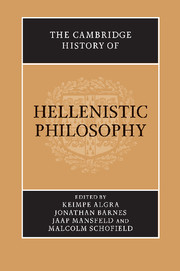Book contents
- Frontmatter
- PART I INTRODUCTION
- 1 Sources
- 2 Chronology
- 3 Organization and structure of the philosophical schools
- PART II LOGIC AND LANGUAGE
- PART III EPISTEMOLOGY
- PART IV PHYSICS AND METAPHYSICS
- PART V ETHICS AND POLITICS
- Synopsis of principal events
- Editions of sources and fragments
- List of abbreviations
- Bibliography
- Index locorum
- General Index
- References
1 - Sources
from PART I - INTRODUCTION
Published online by Cambridge University Press: 28 March 2008
- Frontmatter
- PART I INTRODUCTION
- 1 Sources
- 2 Chronology
- 3 Organization and structure of the philosophical schools
- PART II LOGIC AND LANGUAGE
- PART III EPISTEMOLOGY
- PART IV PHYSICS AND METAPHYSICS
- PART V ETHICS AND POLITICS
- Synopsis of principal events
- Editions of sources and fragments
- List of abbreviations
- Bibliography
- Index locorum
- General Index
- References
Summary
Why so much has been lost
We know a good deal about Hellenistic philosophy, but by no means as much as we would like to know. The reason is that with very few exceptions no works written by the Hellenistic philosophers themselves survive. The situation is therefore quite different from that in which we find ourselves with regard to the great classical philosophers, Plato and Aristotle. Plato's complete works have been preserved. Much of Aristotle's vast output has perished, but the philosophically more important part of his writings is still available. The reason for the preservation of these Platonic and Aristotelian corpora is that these works continued to be taught and studied in the philosophical schools. Treatises of Aristotle were taught by the late Neoplatonists as a preparation for the study of a set of dialogues by Plato, and those of his works which were not part of the curricula have mostly perished. The professional teachers of philosophy themselves were required to have perfect knowledge of practically everything these great masters had written.
But by the end of the third century AD the schools (in the sense both of institutions and schools of thought) which had been founded in the early Hellenistic period had died out. The works of Epicurus and his immediate followers, or of the great early Stoics for example, were no longer taught, though a preliminary instruction in the views of the main schools could still be part of a decent pagan education in the fourth and to a much lesser extent in the fifth and sixth centuries AD.
Information
- Type
- Chapter
- Information
- The Cambridge History of Hellenistic Philosophy , pp. 1 - 30Publisher: Cambridge University PressPrint publication year: 1999
References
Accessibility standard: Unknown
Why this information is here
This section outlines the accessibility features of this content - including support for screen readers, full keyboard navigation and high-contrast display options. This may not be relevant for you.Accessibility Information
- 20
- Cited by
